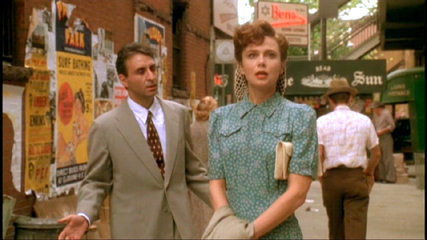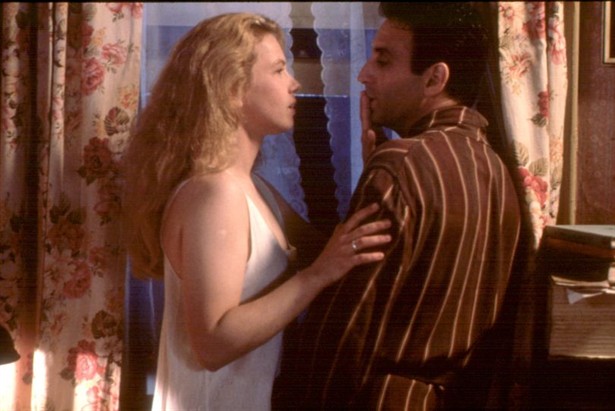From Sight and Sound (Spring 1990). -– J.R.
ENEMIES, A LOVE STORY
‘Although I did not have the privilege of going through the Hitler holocaust, Isaac Bashevis Singer ironically begins his Author’s Note, ‘I have lived for years in New York with refugees from this ordeal. I therefore hasten to say that this novel is by no means the story of the typical refugee, his life, and struggle. Like most of my fictional works, this book presents an exceptional case with unique heroes and a unique combination of events. The characters are not only Nazi victims but victims of their own personalities and fates. If they fit into the general picture, it is because the exception is rooted in the rule. As a matter of fact, in literature the exception is the rule.’
Forewarned is forearmed: Singer’s tragi-comic 1972 novel is a holocaust story, but a far from typical one. Set in New York in 1949-50, it focuses on a Jewish survivor named Herman Broder who finds himself living what amounts to three separate, if sometimes distractingly overlapping lives as a direct consequence of the holocaust’s traumatic upheavals. In Coney Island, he is married to Yadwiga, his former maid in Poland, a non-Jew who kept him alive during the war by hiding him in a hayloft, and who now happily waits on him hand and foot. Herman tells her he is a travelling book salesman who has to spend much of his time in remote American cities. But in fact he ghosts speeches for a wealthy Manhattan rabbi, and is carrying on a torrid affair with Masha, another holocaust survivor, married but separated, who lives with her mother in the Bronx.
It’s a fairly manageable arrangement — at least until Herman discovers that his first wife, Tamara, whom he had heard was killed along with their two children by the Nazis, is alive and well in Manhattan. Herman makes no attempt to conceal his second marriage from Tamara, and before long she learns about Masha too, but wisened and battle-weary from her life in the camps, Tamara makes no marital claims on her husband, serving instead as his friend, adviser and occasional lover. Masha, however, who knows about Herman’s marriage to Yadwiga, is beset with jealousy, and wants to marry him as well, largely for the sake of her mother. Eventually, Herman finds himself with three separate wives in three separate New York boroughs.
The comic side of this situation makes it prime material for a film-maker like PauI Mazursky, but the no less tragic undertones would seem to make it an unlikely subject for a writer-director whose usual stomping ground is the contemporary, upwardly mobile middle-class. From Bob & Carol & Ted & Alice to Down and Out in Beverly Hills, Mazursky has been the staunch defender and celebrator of American bourgeois values, for all his fascination with various kinds of ‘deviance’. Despite periodic efforts to dramatize the dissatisfactions of his usually well-heeled characters that suggest a desire to break out of boulevard comedy, Mazursky generally follows Hollywood formula by coming down squarely on the side of conventional values after extended weekend flirtations with transgression.
All of which leaves one quite unprepared for the absence of glibness in Mazursky’s first real adaptation, Enemies, a Love Story (Fox) –- an exception in his career that does not quite become the rule (by altering one’s judgment of his earlier films), but which does an exceptional job of trying. While he and co-writer Roger L. Simon have needlessly broadened some of the farcical and/or caricatural elements of Singer’s novel — the hamminess of Alan King’s first scene as the rabbi; the contrived comic complications to Herman and Masha’s holiday in the Catskills — they have in general stuck to the tone of the original. And thanks to a superb cast — Ron Silver (Herman), Anjelica Huston (Tamara), Margaret Sophie Stein (Yadwiga), Lena Olin (Masha) — much of the complexity and nearly all the poignancy of Singer’s conception is well served.
What is mainly missing is Singer’s richer sense of the characters — Tamara’s former activities as a Communist and Zionist, Herman’s paranoid revenge fantasies, and the tangled underpinnings of Masha’s suicidal impulses — although the story’s slightly amended conclusion could arguably be defended as an improvement. What remains is Singer’s beguilingly deceptive structure, which begins by positing Herman as the hero of the tale –- cynically defeated in his emotional indecisiveness, though hardly unsympathetic — and then gradually allows his three wives to overtake him, mitigating and eventually subverting most of the story’s male-chauvinist fantasy capers as the trio steadily grow in strength and prominence. Although practically all the story is told from Herman’s viewpoint, he literally vanishes from the plot by the final scene, and it is a crucial part of both Singer and Mazursky’s uncommon achievement that he isn’t missed at all, either by the characters or the audience.
JONATHAN ROSENBAUM





